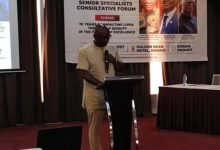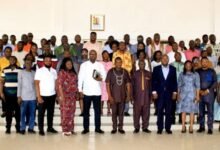
The decision by government to engage with the International Monetary Fund (IMF) for a bailout since its announcement by President Nana Addo Dankwa Akufo-Addo has been greeted with mixed reactions from a cross section of Ghanaians.
While some lauded the decision of government, others were of the view an IMF programme would bring untold hardships to the ordinary Ghanaian.
The President of the Republic, Nana Addo Dankwa Akufo-Addo, last Friday directed the finance minister, Ken Ofori-Atta, to commence formal engagements with the IMF, inviting the Fund to support an economic programme put together by the government of Ghana.
A National Service Personnel (NSP), Innocent Loku, told the Ghanaian Times that the decision for an IMF bailout was not the best since according to him the Electronic Transaction Levy (E-Levy ) was introduced to save us the trouble of going to the IMF.
He mentioned temporary freeze on other austerity measures as some conditions of the IMF that were going to affect the unemployed youth.
Emmanuel Alfred Nii-Martey said he was of the view that the IMF bailout would not address the economic woes of the country.
“The government going to IMF would not be to my favour and with the way the current government is operating I do not trust them to use the IMF funds for the right purposes,” he said.
He indicated government had exhausted all options hence going for an IMF bailout which he described “as a backward move”.
Paul KwesiAgyemanBoadi, an IT expert, expressed his support for the government’s decision to go to the IMF, saying that “the guidelines the IMF will provide could help stabilise the economy as it would help the cedi do better against other currencies”.
He said the programme would force government to cut down on expenditure as well as freeze some allowances that put serious financial burden on government revenues.
An Associate Professor of Economics at the Institute of Statistical, Social and Economic Research (ISSER), Professor Charles GodfredAckah, described the government’s decision to go to the IMF as a step in the wrong direction.
According to him, going to the IMF had always been a temptation to the government but not the most prudent decision for now as there was a need to ascertain what the IMF would do in this situation.
Meanwhile, the International Monetary Fund (IMF) officials will tomorrow officially kick-start negotiations with the government for an economic programme.
The visit will primarily focus on data gathering from all the relevant sectors of the economy.
The IMF officials, comprising senior officers from the Fund and local staff, will meet the Finance Ministry, the Economic Management Team and the President during their stay.
Finance Minister, Ken Ofori Atta, was expected to lead the government team to negotiate with the team and deliberate on the modalities for a package to support the country’s economy.
BY JESSEL LARTEY THERSON-COFIE AND CONNIELOVE MAWUTORNYO DZODZEGBE







